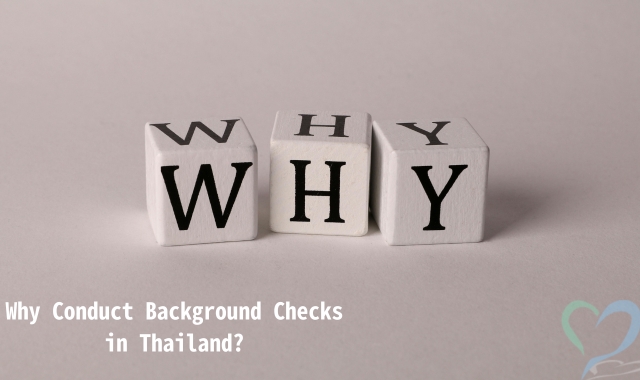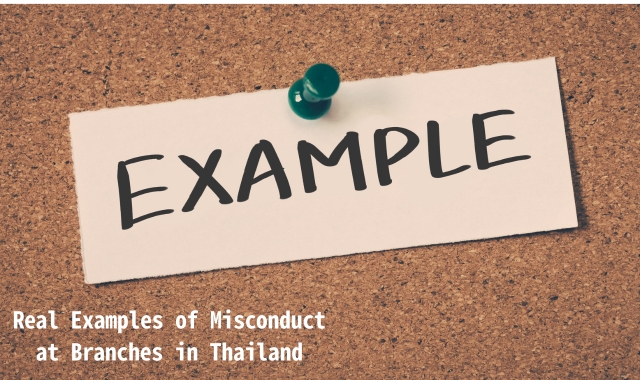Employee Background Check at Branches in Thailand : Key Points for Risk Management
NEWS

Introduction

Why Background Checks Are Critical for Overseas Branches
In an increasingly globalized business landscape, companies that extend operations into international markets stand to gain access to new consumer bases, diversified supply chains, and competitive advantages. However, such expansion also introduces potential vulnerabilities, particularly where local branches operate with greater autonomy than the main office. Employee misconduct—ranging from petty theft and fraud to larger-scale embezzlement—can have a direct impact on the financial health and reputation of the parent company. Additionally, local cultural norms, legal frameworks, and language barriers may limit the parent company’s ability to monitor and control day-to-day operations effectively.
Employee Background Checks function as a foundational tool in risk prevention, ensuring you hire staff who meet not only your job qualifications but also your ethical and compliance standards. By verifying identity, past work history, and possible criminal records, you reduce the probability of onboarding individuals who might engage in unlawful or unethical behavior. This becomes doubly important in Thailand, where legal processes and cultural norms differ from those in Japan, the United States, or European countries. It is worth noting that discrepancies in legal definitions of harassment, fraud, or confidentiality breaches can lead to misunderstandings about employee responsibilities and obligations. Thus, comprehensive background checks help maintain a consistent and robust approach to Risk Management across international branches.
Thailand as a Growing Hub for International Business
Thailand has long been considered a gateway to Southeast Asia, with well-established logistics networks, a robust manufacturing base, and a government actively encouraging foreign investment through various incentives. The country’s infrastructure, including ports, road networks, and telecommunications, stands out among neighboring nations, making it an attractive choice for companies looking to set up operations. Beyond this, Thailand’s large pool of skilled and semi-skilled labor further facilitates the rapid scaling of businesses, particularly in industries like automotive, electronics, textiles, and tourism.
An often-overlooked benefit of Thailand is the relatively high level of English proficiency compared to some of its neighbors, especially in major cities like Bangkok, Chiang Mai, and Phuket. This linguistic advantage eases communication challenges between local employees and foreign managers or executives. However, a growing international presence also brings heightened competition for local talent, which may prompt some companies to rush the recruitment process. Skipping thorough background checks in this rush can expose organizations to individuals who may have undisclosed criminal histories or questionable professional backgrounds.
The Risks of Not Monitoring Employee Behavior Abroad
Managing staff behavior remotely can be challenging when headquarters are separated from overseas branches by time zones, cultural differences, and geographical distance. Internal audits that would normally detect anomalies in financial records or questionable business practices can be less frequent or rigorous in overseas offices, allowing malfeasance to go undetected for longer periods. Additionally, language barriers and differing societal expectations regarding loyalty, conflict resolution, and confrontation can make it difficult for managers to handle issues promptly.
The resulting damage can be multifaceted. Financial losses may occur through theft, embezzlement, or fraudulent reporting. Reputational harm can be equally severe if news of unethical activity reaches clients, local business partners, or regulatory authorities. When misconduct results in legal action, the parent company must allocate additional resources for litigation and public relations, further straining finances and morale. By integrating Employee Background Checks and ongoing oversight into your operational model, you can minimize these risks and protect your enterprise from severe setbacks.
Why Conduct Background Checks in Thailand?

Rapid Expansion of Foreign Businesses in Thailand
Thailand’s position as a regional economic leader, coupled with government-led initiatives to attract foreign direct investment, has led to a surge in international business activity. Companies seeking quick market entry often prioritize immediate staffing needs over thorough vetting processes. While agility is critical in fast-moving industries, overlooking background screening can introduce vulnerabilities from the onset. For example, a new branch office may hire dozens of employees in a short timeframe to meet project deadlines, thereby unintentionally onboarding individuals with dubious records or insufficient qualifications.
Moreover, the competition for top talent in sectors like technology, engineering, and finance intensifies the pressure to make hiring decisions swiftly. Employers in these fields may be concerned that delaying offers to conduct additional screening could cost them the candidate. However, it is crucial to balance speed with due diligence. By establishing clear, systematic procedures for Employee Background Checks, companies can mitigate risks without excessively elongating the recruitment timeline.
Increased Risks: Fraud, Misconduct, Reputational Damage
Thailand’s rapid economic growth can be a double-edged sword. On one hand, there are ample opportunities for profit and partnerships; on the other, the pace of expansion may outstrip companies’ ability to enforce robust internal controls. Without proper oversight, fraud, bribery, theft, and other forms of misconduct become more likely. Even a single instance of employee wrongdoing can erode client trust, compromise valuable business relationships, and tarnish a company’s international reputation.
In a case where a sales manager engages in under-the-table deals with distributors to inflate their own commissions, the company not only loses money but also risks damaging future negotiations with partners who may view the company as complicit. Similarly, an executive found accepting bribes to funnel contracts to certain suppliers can create a scandal that affects the broader brand. These examples underscore that Employee Background Checks offer a preemptive measure to filter out individuals who have a history of unethical or fraudulent behavior.
Cultural and Legal Differences Complicating Risk Management
Thai workplace culture can differ significantly from Western or Japanese norms, shaping attitudes toward hierarchy, communication, and conflict resolution. For instance, the concept of “keeping face” or “kreng jai” can dissuade subordinates from openly challenging or questioning superiors, which may inadvertently allow small issues to grow. In such an environment, fraudulent activities may remain unreported due to deference or fear of reprisal.
From a legal standpoint, Thailand has enacted laws specific to labor protection, data privacy, and personal data usage—most notably the Personal Data Protection Act (PDPA), which took effect relatively recently. Under the PDPA, collecting or storing personal data improperly can result in legal sanctions. Companies must ensure that their Employee Background Checks comply with these regulations, or they risk fines and reputational harm. Having a comprehensive understanding of both Thai labor laws and privacy regulations is crucial to conducting investigations without encroaching on employee rights.
What Risks You Should Watch For

A successful Risk Management strategy begins by identifying possible threats and vulnerabilities. In Thailand, these can vary depending on your industry, scale of operations, and specific corporate structure. Nonetheless, a few common risks stand out as particularly prevalent.
Employee Fraud (e.g., embezzlement, bribery):
Cash-heavy businesses such as retail, hospitality, or manufacturing with daily cash transactions are especially vulnerable. Unchecked access to company funds, combined with insufficient oversight, can lead to embezzlement schemes that go undetected for months.
Breach of Confidentiality (e.g., unauthorized use of trade secrets or customer data):
Data security is increasingly critical in the digital age. If an employee with access to proprietary data decides to sell or leak information, the repercussions can include loss of competitive advantage, legal ramifications, and customer distrust.
Conflicts of Interest with Local Partners (e.g., under-the-table deals):
Corporate cultures vary in their tolerance of gifts, favors, and informal agreements. Employees who have personal relationships with local suppliers or government officials may find themselves in conflict-of-interest scenarios if they prioritize these personal ties over the company’s best interests.
Unauthorized Resale of Company Assets (e.g., selling inventory or equipment):
Company laptops, phones, vehicles, or surplus inventory can be resold on secondary markets for personal gain. This is more likely to happen when there is no strict system for tracking assets, or when an employee feels confident they will not be caught.
Hidden Criminal Records or Financial Instability (e.g., falsifying personal information):
Some individuals may deliberately hide past criminal convictions or ongoing financial troubles to secure employment. Such issues can, in extreme cases, manifest in workplace theft, fraud, or absenteeism if the employee is under personal financial pressure.
Real Examples of Misconduct at Branches in Thailand

Accounting Fraud: Inflating travel or entertainment expenses and submitting fake receipts
This often starts off as a small, one-time act of doctoring an invoice or receipt. If the environment lacks routine audits, the wrongdoing can escalate into habitual fraud, resulting in significant financial losses over time.
Embezzlement: Diverting daily sales into personal accounts
A cashier, accountant, or finance officer may see an opportunity to skim from daily revenue. In some cases, they might create fictitious vendor accounts or manipulate bookkeeping entries to mask the theft.
Unauthorized Resale: Selling company laptops, smartphones, or inventory for personal profit
A manager might systematically remove new products from the warehouse and claim they were damaged or lost, only to sell them in local markets or online platforms. Without rigorous inventory checks, such activity can remain undetected indefinitely.
Each of these examples underscores the importance of robust checks, both at the hiring stage and during employment. Overlooking red flags or failing to verify a candidate’s past records can result in significant liabilities down the line.
Key Elements of an Effective Background Check

Verifying Identity and Work History
A thorough Background Check starts with confirming that a candidate is who they claim to be and that their professional résumé is accurate. This step involves:
Reviewing Identification Documents:
Validating passports, national IDs, and any work permits to ensure they are not counterfeit or expired.
Cross-Checking Employment Dates and Job Titles:
Contact previous employers to confirm the duration of employment, job responsibilities, and reason for leaving. Be mindful of potential embellishments or gaps in a candidate’s work history.
Verifying Educational Credentials:
In some roles—particularly those requiring specialized skills or certifications—verifying academic achievements is essential. Some candidates may claim degrees from institutions they never attended or misrepresent their majors.
Checking Criminal Records and Civil Litigation
Next, investigate whether the individual has any previous criminal convictions, civil lawsuits, or ongoing legal disputes. This requires:
Collaboration with Local Agencies or Investigative Firms:
Publicly accessible databases for criminal records or court proceedings in Thailand may be limited or only available in Thai. A local partner or professional service can help navigate bureaucratic procedures for accurate data.
Ensuring Compliance with Privacy Laws:
Thailand’s PDPA sets forth guidelines on how personal data should be collected, stored, and used. Make sure you obtain candidate consent where required and use only lawful channels to access sensitive information.
Distinguishing Minor Offenses from Serious Ones:
Not all legal issues carry the same weight. A historical minor traffic violation differs from a fraud conviction. Striking the right balance in assessing the severity and relevance of any prior infractions is essential.
Monitoring Lifestyle and Spending Patterns
Another dimension of Risk Management focuses on an employee’s financial stability and lifestyle choices:
Red Flags in Sudden Wealth or Debt:
An employee who rapidly shifts from living modestly to displaying considerable wealth may have access to unaccounted-for funds. Conversely, individuals with large debts could be more susceptible to bribery or theft.
Social Media Scrutiny:
While privacy considerations are vital, publicly shared information on social media can offer insights into an individual’s lifestyle. Extravagant postings, high-risk behavior, or connections to questionable networks can raise red flags.
Anonymous Tips and Whistleblowing Mechanisms:
Encouraging anonymous reporting systems allows colleagues to voice concerns about suspicious activity without fear of retaliation. However, any reported behavior must be investigated carefully to avoid false accusations or defamation risks.
Ensuring Compliance with Thai Labor Laws and Privacy Regulations
Conducting Employee Background Checks responsibly involves strict adherence to local regulations:
Understanding Legal Obligations:
Familiarize yourself with the Thai Labor Protection Act, Personal Data Protection Act, and any other relevant laws. These regulations specify what information can be collected, how it should be stored, and the need for explicit consent in certain cases.
Seeking Legal Counsel:
When in doubt, consult with local attorneys or compliance experts to confirm the legality of your investigation methods. Even if standard practices in Japan or another country allow certain inquiries, Thai laws may have stricter interpretations of privacy or data handling.
Documenting the Process:
Keep detailed records of all checks performed and permissions obtained. This transparency not only protects the company if legal questions arise but also builds a culture of accountability.
How a Professional Investigator Can Help

Access to Local Databases and Resources
Professional investigators or specialized background screening firms operating in Thailand often maintain extensive networks that provide quicker and more direct access to local databases, court archives, and government agencies. Unlike a foreign parent company, these experts understand procedural nuances, including:
Language Proficiency:
Navigating Thai-language records is easier for native speakers who can interpret documents or interview local officials directly.
Bureaucratic Processes:
Knowledge of specific documents, forms, and timelines ensures efficient investigations, reducing the risk of delays or incomplete data collection.
Discreet and Legal Investigations
Maintaining confidentiality while gathering information legally is one of the biggest challenges for companies conducting background checks in foreign jurisdictions. A professional investigator:
Conducts Covert Inquiries as Needed:
If there is suspicion of ongoing misconduct, a discreet approach can help gather evidence without alerting the suspect prematurely.
Understands Boundaries:
Professionals know the limits set by Thai defamation laws, privacy regulations, and labor protections. They can gather evidence without violating individual rights or exposing the company to lawsuits.
Protects Company Reputation:
Publicly revealing an investigation can cause rumors and damage employee morale. Experts use discreet methods that preserve corporate image while still uncovering the facts.
Timely Reporting and Risk Analysis
In a rapidly evolving market like Thailand’s, time can be a critical factor:
Speedy Investigations:
Rapid detection of fraudulent behavior or criminal background can prevent greater losses. Professionals working in the field can expedite the process using established local networks.
Comprehensive Risk Assessment:
Beyond merely presenting findings, reputable investigative firms can provide actionable insights. They identify patterns, potential vulnerabilities, and recommendations for policy changes or internal controls.
Supporting Evidence for Internal and Legal Actions:
Should the investigation confirm severe misconduct, having properly documented evidence supports the company in taking disciplinary measures or pursuing legal recourse. Thorough documentation also aids in building a robust defense if the case escalates to court.
Case Study Example
Consider a scenario where a newly hired finance manager in a Thai subsidiary was suspected of embezzling funds. A professional investigation team, proficient in Thai and intimately familiar with local banking processes, quickly identified suspicious transactions through cross-checking bank statements and analyzing patterns in general ledgers. The timely submission of a detailed report allowed the parent company to terminate the individual’s employment and initiate legal proceedings before the losses escalated. This real-world scenario underscores the value of professional expertise in mitigating risk effectively.
Conclusion

Conducting Employee Background Checks in Thailand is not merely a formality; it is a critical component of a broader Risk Management strategy. From verifying basic identity and educational credentials to uncovering past criminal records and ongoing legal disputes, a well-executed background check can significantly reduce the potential for workplace misconduct. Given the unique cultural and legal landscape in Thailand, companies must adapt their screening processes to local realities. This means staying informed about changes in labor laws, privacy regulations like the PDPA, and evolving business practices.
The benefits of thorough background checks are manifold. First, they reduce the likelihood of fraudulent activities, like embezzlement or unauthorized resale of assets, by filtering out candidates with histories of unethical conduct. Second, they help preserve your organization’s reputation in a competitive international market. Negative headlines or public scandals can deter prospective business partners and clients, ultimately affecting your bottom line. Third, they set a strong organizational tone, signaling to current and future employees that integrity and transparency are valued.
Importantly, Risk Management does not end with hiring. Continuous monitoring of employee behavior, clear reporting channels for whistleblowers, and periodic internal audits all work in tandem with background checks to create a culture of accountability. Implementing these measures responsibly requires balancing corporate interests with employee privacy rights. Consultation with legal experts and possibly engaging professional investigative services ensures that your background check process is both effective and compliant with Thai law.
Finally, remember the importance of early-stage vetting: integrating background checks at the recruitment and interview phases. By conducting diligent screenings before making an employment offer, you prevent many issues from taking root in the first place. This is particularly relevant in Thailand’s fast-growing market, where rapid recruitment can sometimes overshadow due diligence. Done correctly, employee background checks are a cost-effective way to protect your investments, solidify your international reputation, and maintain operational excellence in your Thai branches.
- The Mystery of Johatsu: Japan’s Vanishing People Phenomenon
- Uncovering the Truth | Investment Investigations
- Real Estate Investigations: Safeguarding Your Investments
- Employee Background Check at Branches in Vietnam: Key Points for Risk Management
- Employee Background Check at Branches in Thailand : Key Points for Risk Management
- Finding Your Fiancée Who Disappeared After Getting Engaged Overseas